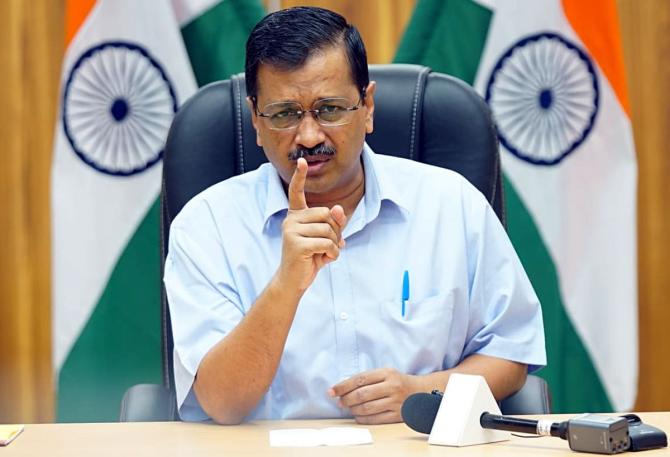Amid a spurt in coronavirus cases in Delhi, Chief Minister Arvind Kejriwal on Tuesday sought power from the Centre to impose lockdown in those markets which may emerge as COVID-19 hotspots, and decided to withdraw an order allowing 200 guests to attend wedding functions.

Addressing an online media briefing, Kejriwal said the Delhi government has sent a proposal to Lt Governor Anil Baijal to allow only 50 people to attend wedding ceremonies against the earlier limit of 200.
"As per directions and guidelines of the Centre, 200 participants were earlier allowed in wedding ceremonies due to decreasing number of coronavirus cases.
"Now, a proposal has been sent to LG Baijal for his approval to withdraw the previous order and bring the number of guests for wedding ceremonies back to 50 from 200," he said.
The chief minister said the Centre and all agencies are making 'double efforts' to control the COVID-19 situation in the national capital.
"We are sending a proposal to the Centre to give power to the Delhi government to impose lockdown in market areas which may emerge as COVID-19 hotspots," the chief minister said.
During Diwali, it was seen that many people were not wearing masks and violating social distancing norms due to which the coronavirus spread very much, he said.
"I hope the crowd in the markets will thin out and there will be no need to lock them down.
"However, if violations of mask wearing and social distancing are witnessed and there is chance of these markets becoming local coronavirus hotspots, these could be shut down as a preventive measure for some days, said Kejriwal.
On Monday, Health Minister Satyendar Jain had said there was no chance of reimposition of lockdown in the national capital since the third wave of the coronavirus has peaked out in the city.
Jain had also said the virus cannot be contained through lockdown and that people should protect themselves by wearing face masks.
During the media briefing on Tuesday, Kejriwal thanked the central government for helping people of Delhi in 'such difficult times' and appealed to Delhiites with folded hands to wear masks and follow social distancing norms.
The chief minister said availability of COVID-19 beds in government and private hospitals was satisfactory and thanked the Centre for its promise to arrange 750 ICU beds at a DRDO facility.
"All the stakeholders, including the Delhi government, the Centre and various agencies are making double efforts to bring COVID-19 under control, but people need to wear masks and maintain social distancing," he said.
"All this is being done for you and your family. So I appeal to you, please, please, please wear face masks and follow social distancing," the chief minister said.
The coronavirus does not differentiate between the rich and the poor and it can infect anyone, but some people think they may not contract the virus, he added.
Delhi has witnessed a spurt in novel coronavirus cases since October 28 when the daily rise breached the 5,000-mark for the first time and it crossed the 8,000-mark on Wednesday.
On Thursday, 104 coronavirus-related deaths, the highest in over five months, were recorded in the city.
On Monday, Delhi recorded 3,797 fresh COVID-19 cases, taking the infection tally in the national capital to over 4.89 lakh, even as 99 new fatalities pushed the toll to 7,713.
These relatively low number of fresh cases came out of the 29,871 tests conducted on Sunday.










